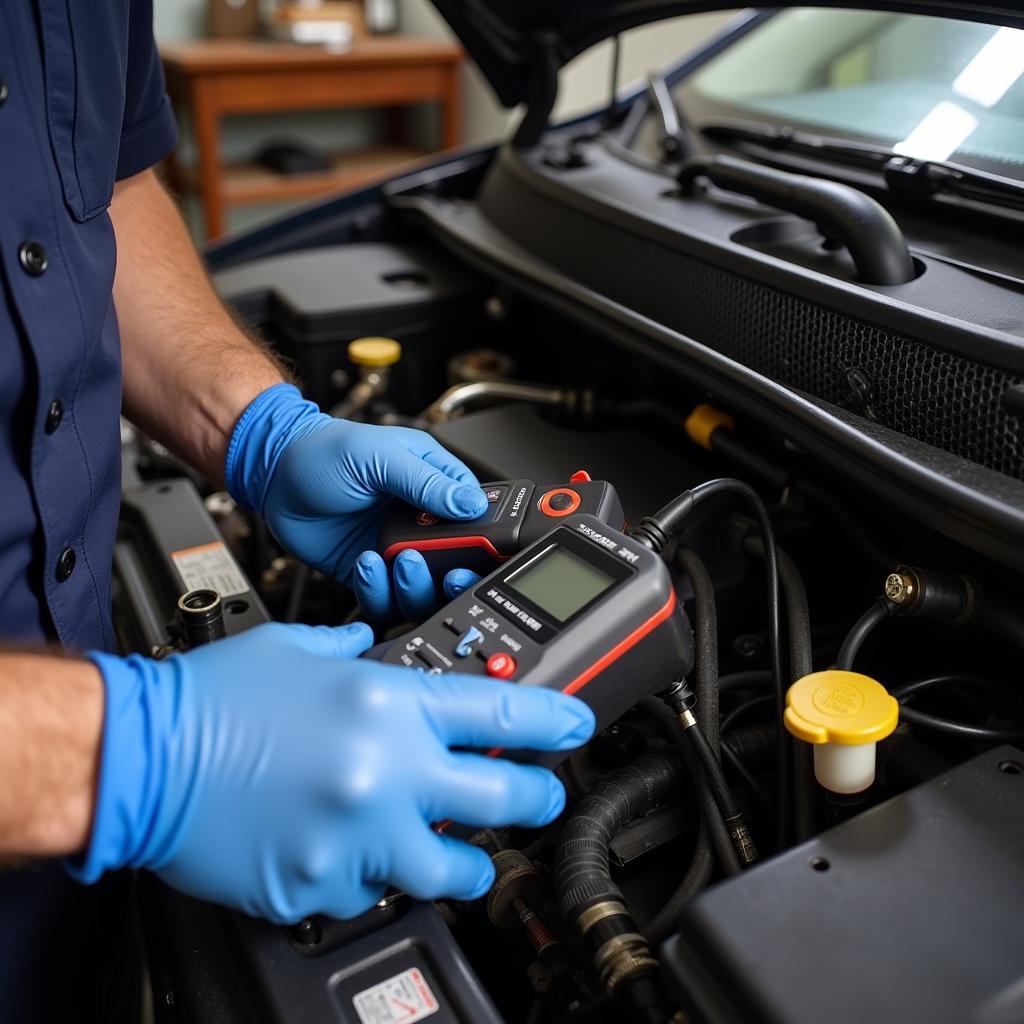Experiencing warm air blowing from your car’s AC vents on a scorching summer day? A car AC refrigerant leak is a common culprit behind this unwelcome surprise. This comprehensive guide delves into the intricacies of refrigerant leaks, empowering car owners, repair shops, and technicians with the knowledge to diagnose and address this issue effectively.
One of the first signs of a refrigerant leak is that your AC isn’t blowing cold air as efficiently as it used to. This is often accompanied by a hissing sound when the AC system is running, indicating escaping refrigerant. Ignoring these signs can lead to a complete system shutdown, turning your car into a mobile sauna during hot weather.
Understanding Car AC Refrigerant Leaks
Before diving into the “how-to-fix-it” part, let’s understand the problem. Your car’s AC system relies on refrigerant, a special fluid, to cool and dehumidify the air. This refrigerant circulates in a closed loop, absorbing heat from the cabin and releasing it outside. A leak in this loop disrupts the cooling cycle, rendering your AC ineffective.
Common Causes of Refrigerant Leaks
Identifying the source of the leak is crucial for effective repair. Refrigerant leaks can spring from various components within the AC system, including:
- Hoses and connections: Vibrations and wear and tear can cause cracks or loosen connections, leading to leaks.
- O-rings and seals: These rubber components can deteriorate over time, causing refrigerant to escape.
- Condenser: Located at the front of the vehicle, the condenser is susceptible to damage from road debris, leading to leaks.
- Evaporator: Positioned behind the dashboard, the evaporator is less prone to physical damage but can develop leaks due to corrosion.
Diagnosing a Car AC Refrigerant Leak
Pinpointing the exact location of a refrigerant leak requires specific tools and expertise. Here are some common methods used:
- Visual inspection: Look for signs of oil residue around AC components, which can indicate a leak.
- Electronic leak detector: This sensitive device can detect even the smallest refrigerant leaks.
- UV dye injection: Injecting a special dye into the AC system allows technicians to use a UV light to trace the leak path.
 Car AC Refrigerant Leak Detection
Car AC Refrigerant Leak Detection
How to Fix a Car AC Refrigerant Leak
Fixing a refrigerant leak is not a DIY task for the average car owner. It requires specialized equipment, refrigerant handling knowledge, and safety precautions. Here’s a general overview of the repair process:
- Identify and repair the leak: This involves locating the leak source and replacing the damaged component, such as a hose, O-ring, or seal.
- Evacuate the system: Once the leak is repaired, the remaining refrigerant and any air or moisture must be removed from the system using a vacuum pump.
- Recharge the system: The AC system is then recharged with the correct type and amount of refrigerant, restoring its cooling capacity.
Cost of Fixing a Car AC Refrigerant Leak
The cost of repairing a car AC refrigerant leak varies significantly depending on several factors:
- Severity of the leak: A simple O-ring replacement is less expensive than replacing a major component like the condenser.
- Labor costs: Labor rates can differ based on location and the mechanic’s expertise.
- Vehicle make and model: Some vehicles have more complex AC systems, potentially increasing repair costs.
On average, you can expect to pay anywhere from $150 to $1,000 or more to fix a car AC refrigerant leak.
If you’re interested in learning more about the costs associated with different car AC repairs, check out our comprehensive guide on how much does it cost to fix broken car ac.
 Recharging Car AC System with Refrigerant
Recharging Car AC System with Refrigerant
Preventing Future Leaks
While some causes of refrigerant leaks are unavoidable due to wear and tear, proactive maintenance can significantly reduce the risk:
- Regular AC system inspections: Have your AC system inspected annually by a qualified technician.
- Timely repairs: Address any AC-related issues promptly to prevent further damage and potential leaks.
- Avoid DIY refrigerant top-ups: Refrigerant is a hazardous substance and should only be handled by professionals.
When to Seek Professional Help
Attempting to fix a car AC refrigerant leak yourself can be dangerous and lead to further damage. If you suspect a leak, it’s crucial to seek help from a qualified mechanic specializing in car AC repair.
A few signs indicate the need for professional intervention:
- Warm air blowing from the vents: This is a clear sign that your AC system is not functioning correctly.
- Hissing or bubbling sounds: These sounds can indicate escaping refrigerant.
- Visible oil residue: Oil around AC components suggests a leak.
- Unexplained decrease in AC performance: If your AC is not cooling as effectively as it used to, it’s essential to have it checked.
Finding skilled mechanics that fix air conditioners in cars ensures that your AC system is in capable hands, restoring its cooling power and keeping you comfortable on the road.
Conclusion
A car AC refrigerant leak is a common issue that can quickly turn your comfortable ride into a sweltering experience. Understanding the causes, symptoms, and repair process empowers you to address this problem effectively. Remember, seeking professional help is crucial for safe and effective refrigerant leak repair, ensuring your car’s AC system blows cold air for miles to come.
Need help with your car’s AC? Don’t hesitate to contact the experts at AutoTipPro. Call us at +1 (641) 206-8880 or visit our office at 500 N St Mary’s St, San Antonio, TX 78205, United States. We’re here to help you beat the heat!




Leave a Reply